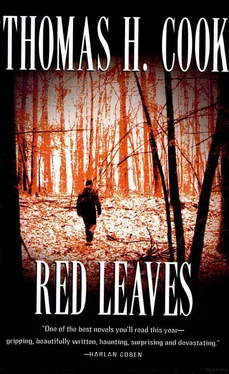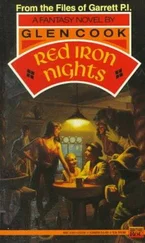"So they think he was watching her," I said.
"We can't be sure what they're thinking."
"Oh come on, Leo, why would his cigarettes be there, at her window?"
"Not his," Leo cautioned. "Just the brand he smokes."
"Don't talk to me like a lawyer, Leo," I said. "This is bad and you know it."
"It doesn't help things," Leo admitted.
"They're going to arrest him, aren't they?"
"Not yet," Leo said.
"Why not?" I asked. "We both know they think he did it."
"First of all, no one knows what was done," Leo reminded me. "Remember that, Eric. Whatever the police may be thinking, they don't know anything. And there's something else to keep in mind. Keith didn't have a car. So how could he have taken Amy from her house?"
I made no argument to this, but I felt the water around me rise slightly.
"Eric?"
"Yes."
"You have to have faith."
I said nothing.
"And I don't mean that in a religious way," Leo added. "You have to have faith in Keith."
"Of course," I said quietly.
There was a pause, then Leo said, "One final ... difficulty."
I didn't bother to ask what it was, but only because I knew Leo was about to tell me.
"Keith ordered a pizza for dinner that night," Leo said. "The pizza guy delivered it at just after eight. He said that when he arrived, he didn't see Amy, but Keith was there, and he was on the phone."
"The phone?"
"Did he call you that night?"
"Yes."
"When did he call?"
"Just before ten."
"Not before?"
"No."
"You're sure about that," Leo said. "You're sure that Keith only called you once that night."
"Only once," I said. "At around ten."
"And that's when he told you he'd be late and that he wouldn't need a ride, correct?"
"Yes."
"Because he had a ride?"
"No," I said. "He said that he could get a ride."
"But not that he had one?"
"No, not that he had one."
"Okay," Leo said.
"So who was he on the phone with?" I asked. "When the pizza guy was there."
"I'm sure the police have the number," Leo said. "So it won't be long before they tell us."
We talked a few minutes longer, Leo doing what he could to put the best light on things. Still, for all his effort, I could sense nothing but a spiraling down, a room closing in, slowly dwindling routes of escape.
"What happens," I asked finally, "if they never find Amy?"
"Well, it's awfully hard to convict when there's no body," Leo answered.
"I wasn't thinking of that," I told him. "I mean, Keith would have to live with it, wouldn't he? The suspicion that he killed her."
"Yes, he would," Leo answered. "And I admit, cases like that, without any definite resolution, they can be painfid to all concerned."
"Corrosive," I said softly, almost to myself.
"Corrosive, yes," Leo said. "It's hard, when you can't get to the bottom of something."
I had never known how true that was before that moment, how little whiffs of doubt could darken and grow menacing, urge you forward relentlessly, fix you in a need to find out what really happened. "Otherwise your whole life is an unsolved mystery," I said.
"Yeah, it's just that bad," Leo said. "You become a cold-case file."
A cold-case file.
I remember thinking that that was precisely what I was becoming, and that for the rest of that day, as I dealt with customers, framed a few pictures, I felt a fierce urgency building in me, a need to know about Keith, the life he might have hidden from me, the terrible thing I could not keep myself from thinking that he might, indeed, have done.
Just before I closed, I called Meredith and told her what Leo Brock had earlier told me. I expected her to be irritated that I hadn't called before, accuse me once again of refusing to confront things, but instead she took the latest development without surprise, as if she'd been expecting it all along.
"I have to work late tonight," she said. Her voice struck me as oddly wistful, like a woman who'd once lived in a perfect world, known its beauty and contentment, a world that was no more and would never be again. "I should be home by eleven."
I was on my way to my car a few minutes later when I noticed Warren's truck parked outside Teddy's bar. I guessed that he was probably drinking earlier and earlier, his usual pattern before plunging into a full-blown binge. In the past, I'd never been able to prevent his periodic dives, and because of that I had more or less stopped trying. But suddenly, faced with my own family problems, I found that I could see his more clearly. The contempt my father had so relentlessly heaped upon him had stolen away any shred of self-confidence he might otherwise have grasped, then the tragedy of Jennys death, and after that, my mother's fatal accident. Perhaps, I told myself, he was not so much one of life's pathetic losers, as simply a man who had lost a lot.
He was sitting in the back booth, his paint-spattered hands wrapped around a mug of beer.
"Hey, Bro," he said as I slid into the seat opposite him. He lifted the beer. "Want a frosty?"
I shook my head. "No, I don't have much time. Meredith's working late, so I have to get home, make dinner for Keith."
He took a sip of the beer. "So," he said. "How's tricks?"
I shrugged. "The same."
"And this thing with Keith?"
"I have the feeling the cops are focusing on him." I added no further details, and typically, Warren didn't ask.
Instead he said, "They jump to conclusions, the cops. It only takes some little thing." He laughed. "But, that's the way we all are, right? Obsessed."
"Why do you say that?"
"You know, the way some crazy idea won't stop nagging at a guy."
Warren often spoke of himself in the third person, as "a guy."
"What crazy idea is nagging at you, Warren?" I asked.
I thought it was probably something about Keith, but I was wrong.
"For some reason I keep thinking about Mom," Warren said. "You know, how upset she was toward the end."
"Well, why wouldn't she be?" I said. "She was losing her house."
"That wasn't it," Warren said. "She never liked that house."
"She never liked the house?"
"No, she hated it," Warren said. He took a sip of beer. "It was too big, she said, too much to take care of."
"I didn't know she felt that way," I said.
"The house was for Dad," Warren said. "Part of the show. He wanted it because it made people think he was a big important guy." He glanced away, then back to me. "You seen him lately?"
"I see him every Thursday."
Warren smiled. "Dutiful," he said. "You've always been dutiful with Dad."
He made duty sound oddly disreputable. "I don't want him to feel abandoned, if that's what you mean."
Warren took a hard pull on the beer. "I dropped in on him this morning," he said. He looked at me with a bitter grin. "He said he never wanted to see me again."
"What? Why?"
"Because of what I told you, that insurance guy."
"Dad doesn't want to see you again because of that?" I asked unbelievingly.
"Yup," Warren said, now trying to make light of it. "Funny world, huh, Eric?"
I waved my hand. "He'll get over it."
Warren shook his head adamantly. "No, he won't. Not this time. I really pissed him off."
"But it was nothing," I argued.
"Not to Dad," Warren said. "He got in a real lather about it."
I recalled the look on my father's face when I'd broached the same subject with him, and suddenly I realized that the part of me that wished to avoid things, the part Meredith had long recognized, was dead. My suspicion had begun with a subtle itch, but now it was a raging affliction, a thousand bleeding sores I couldn't stop digging at.
"What's he hiding, Warren?" I asked bluntly.
Warren's eyes fell toward his hands.
Читать дальше












